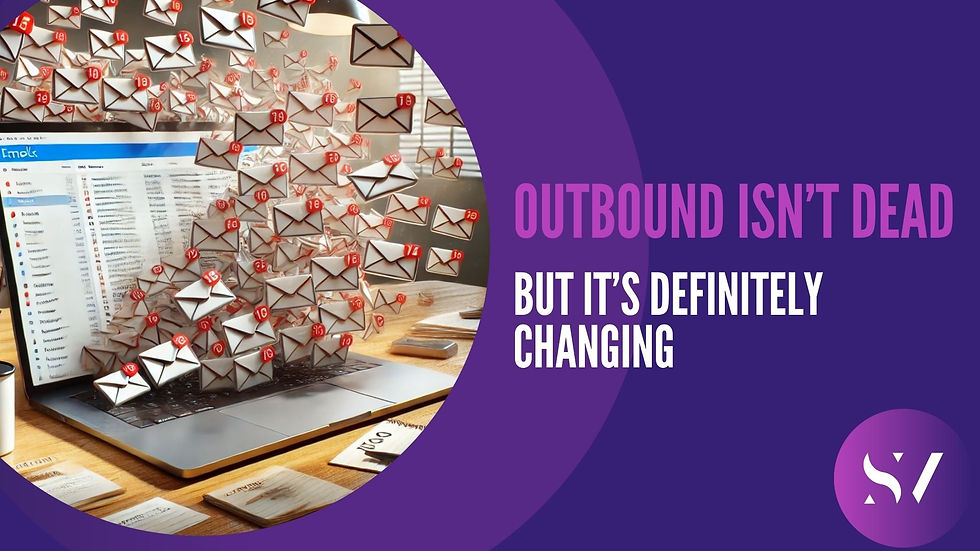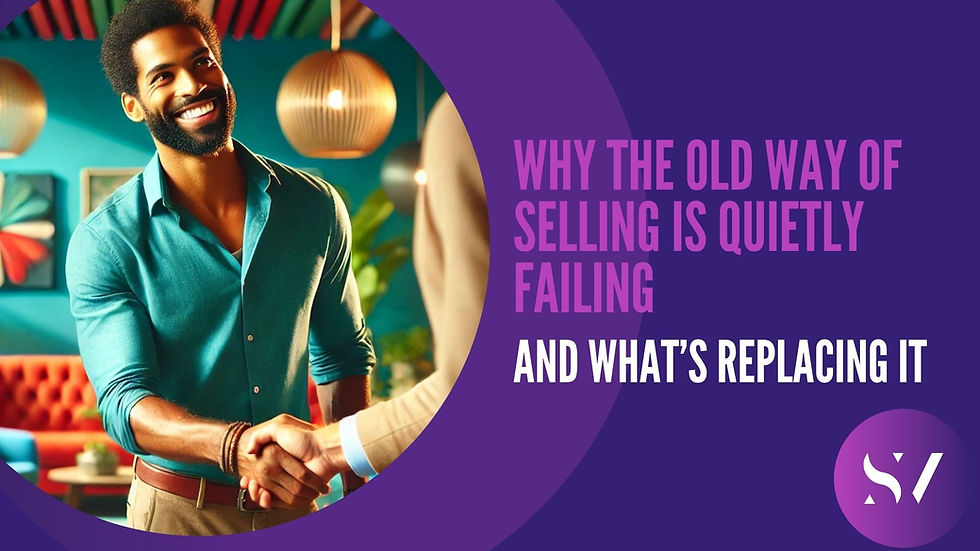Events Aren’t the Goal. They’re the Starting Point.
- Sara Osterholzer
- Sep 8, 2025
- 4 min read
Don’t pitch. Host. Teach. Listen. Then follow up like a pro.
You’ve done the webinar. Maybe even the in-person breakfast.
Sales showed up. Marketing sent the follow-up. You even got some “great feedback.”
And then…Silence.
No pipeline.
No content.
Just another CRM list gathering dust.
It’s not that your event didn’t go well.
It’s that the value got trapped inside it - and your follow-up was (how do we put this?)... optimistic.
Welcome to the modern B2B event cycle: big energy, vague results.
But it doesn’t have to be that way.

💡 From Broadcasts to Conversations: What Events Should Actually Do
Most B2B events - virtual or in-person - still fall into the same trap: a lightly disguised sales pitch.
You invite senior decision-makers to a “roundtable on trends”...
And then serve up a 20-minute product roadmap walkthrough.
They smile. They nod. They leave - and forget it ever happened.
Because they didn’t come to be pitched. They came to learn.
And that mismatch? It quietly kills trust, traction, and future engagement.
The fix? Flip the script.
Stop building events around what you want to say. Build them around what your buyers need to hear.
Ask:
What are they unsure how to respond to?
What’s coming up in every sales call?
What challenges are getting ignored by the broader market?
If your event becomes a shortcut to clarity - not just another 45-minute Zoom slot - you're on the right track.
📞 The Best Topics Don’t Come from a Whiteboard. They Come from the Market.
Great events don’t start with content.
They start with calls.
At Second Voice, we begin by speaking directly to our market:
“What’s changed for you this quarter?”
“What’s becoming harder to get right?”
“What would you genuinely show up to learn more about?”
We look for recurring patterns and turn them into event themes that feel timely, useful, and specific.
This approach transforms our event from:
A generic webinar → into a mirror of our audience’s current reality
Another sales channel → into a space for shared insight
Vendor noise → into market signal
And buyers notice the difference.

🗣️ It’s Not a Stage. It’s a Roundtable.
Once you’ve got the right topic - how you deliver it matters just as much.
Death-by-deck isn’t a format. It’s a fast way to make your audience disengage.
Instead, the best events feel like smart conversations between peers. Whether it’s virtual or in-person, the goal is the same:
Make people feel heard, included, and smarter by the end.
How to design that experience:
Keep groups small and curated - make it feel personal
Ask attendees what they’d love to explore beforehand
Facilitate, don’t present - let people unmute, challenge, contribute
Feed them if it’s IRL (croissants = community)
It’s not just more engaging - it’s more memorable.
And memorable is what gets you into follow-up conversations.
🔁 The Real Work Happens After the Event
Here’s where most teams fall short: post-event follow-up.
Let’s be honest:
Some people RSVP’d and ghosted
Others came but stayed silent
A few leaned in - but aren’t quite sales-ready
Drop the ball here and you’re not just missing pipeline - you’re wasting all the insight you just gathered.
What strong follow-up actually looks like:
1. Segmented Emails
Attendees: A thank-you, relevant resources, and clear next steps
No-shows: Recap with social proof - “Here’s what your peers found most useful”
2. Repurposed Content
Blog posts
Short-form videos for LinkedIn
One-pager cheat sheets or insight decks
Sales nurture content
3. Sales Enablement Fuel
Give reps more than “just checking in”
“We ran a roundtable with your peers. One point really stood out - want a 2-min takeaway?”
This kind of follow-up keeps the value moving.
It bridges the gap between event interest and pipeline action.

🧠 One Event. Multiple Campaigns.
Let’s bring it to life with a real-world example.
Say you're targeting Ops Directors in logistics. You could blast 100 cold emails asking for “15 minutes”…Or - you flip it:
Call the 100 to find out what they’re struggling with
Turn those insights into a session: “The Ops Leaders’ Playbook: Surviving Margin Pressure in 2025”
Invite everyone - especially the “not right now” crowd
Run it. Record it. Repurpose it
Let Sales re-engage with real value - not recycled intros
The result?
✅ Cold leads rewarm
✅ Sales have something actually useful to send
✅ Marketing has content from the market, not just for it
✅ And your brand shows up as insightful - not interruptive
TL;DR - For the Skimmers
Most events flop because they’re really just sales pitches
Start with calls to your market - not guesswork in a boardroom
Facilitate conversations that teach, not presentations that talk at
Follow up like you mean it - because that’s where the pipeline happens
One well-run event can fuel months of campaign content
✅ Want Events That Actually Drive Pipeline?
At Second Voice help B2B teams run end-to-end event campaigns that turn conversations into conversions.
From the first phone call to the final follow-up, we:
Build your invite list
Call your market (as you)
Shape the insight
Run the event
Repurpose the content
Book meetings with warm, relevant prospects
Want to test the model with one event?
Or build a repeatable system that compounds over time?
👉 Let's chat. Always open to sharing how to build something your buyers actually want to show up for.



